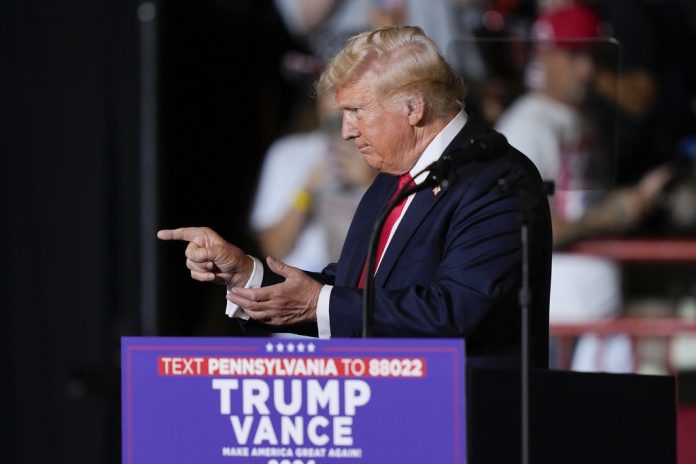NEW YORK (AP) — A New York appeals court on Thursday denied Donald Trump’s bid to end a gag order in his hush money criminal case, rejecting the Republican former president’s argument that his May conviction “constitutes a change in circumstances” that warrants lifting the restrictions.
A five-judge panel in the state’s mid-level appellate court ruled that the trial judge, Juan M. Merchan, was correct in extending parts of the gag order until Trump is sentenced, writing that “the fair administration of justice necessarily includes sentencing.”
The ruling came a day after Trump’s lawyers tried to file papers asking the appellate court to immediately lift the gag order. With its ruling imminent, the court rejected the filing, which called the restrictions an “unconstitutional, election-interfering” muzzle on Trump’s free speech.
In a copy of the prospective filing provided to the Associated Press, Trump’s lawyers wrote that Vice President Kamala Harris’ entry into the presidential race gives the matter new urgency as she pits herself as an ex-prosecutor taking on a “convicted felon.”
“It is unconscionable that Harris can speak freely about this case, but President Trump cannot,” Trump lawyer Todd Blanche wrote.
Blanche declined to comment on Thursday’s ruling.
Merchan imposed the gag order in March, a few weeks before the trial started, after prosecutors raised concerns about Trump’s habit of attacking people involved in his cases. During the trial, he held Trump in contempt of court and fined him $10,000 for violations, and he threatened to jail him if he did it again.
The judge lifted some restrictions in June, freeing Trump to comment about witnesses and jurors but keeping trial prosecutors, court staffers and their families — including his own daughter — off limits until he is sentenced.
Trump, who has denied any wrongdoing, was originally scheduled to be sentenced July 11, but Merchan postponed it until Sept. 18, if necessary, while he weighs a defense request to throw out his conviction in the wake of the Supreme Court’s presidential immunity ruling.
A Manhattan jury convicted Trump on May 30 of falsifying records to cover up a potential sex scandal, making him the first ex-president convicted of a crime.
Trump’s conviction, on 34 felony counts, arose from what prosecutors said was an attempt to cover up a hush money payment to porn actor Stormy Daniels just before the 2016 presidential election. She claims she had a sexual encounter with Trump a decade earlier, which he denies.
Trump’s former lawyer Michael Cohen paid Daniels and was later reimbursed by Trump. Prosecutors said Cohen disguised the reimbursements with Trump’s knowledge by submitting monthly invoices for retainer payments as his personal lawyer. Trump’s company logged the payments to Cohen as legal expenses.
Prosecutors said the Daniels payment was part of a broader scheme to buy the silence of people who might have gone public during the 2016 campaign with embarrassing stories alleging Trump had extramarital sex.
Trump denies any wrongdoing and has pledged to appeal his conviction, but he would not be able to do so until he is sentenced.
Source: post





